This year I decided to take on a year of health experiment rather than making new year resolutions that don’t stick for long.
Each month I’m focusing on a different health topic like nutrition, relationships, or stress management. I pick a nonfiction book to read in the first half of the month and then attempt to implement what I’ve learned in the second.
April Topic: Sleep
For the month of April, I chose to learn more about sleep. Sleep is something I’ve always made a priority. Perhaps not always getting enough as a college student or young adult but I have never been a person who can function “normally” on little sleep.
I’m definitely in that group of adults that needs more of the 8.5 to 9 hour range of rest to feel refreshed the next day. The consequences of getting less are immediately apparent to me with fogginess and headaches. If I get significantly less, like only 4 to 5 hours, I even feel similar effects to being intoxicated. My biggest concern about becoming a mother (besides labor fears) is how I’ll handle the lack of sleep.
It’s now pretty common knowledge that getting enough sleep is essential for good health. Studies have been proving that for the last few decades and there’s been a swing back toward the importance of good rest. I see that most often when it comes to children’s sleep.
What is fascinating to me about this topic is how opposite our society’s set up and values are to encouraging good sleep. The prominent attitude is still that sleep is unnecessary, overrated, or a waste of productive time.
Often people who are considered successful brag about how little sleep they get because they’re always working. Doctors and politicians are portrayed as operating on little to no sleep like they’re superhuman. College students feel they have to limit sleep so they don’t miss out on anything. Even our latest technological developments work against the body and make good rest harder to achieve.
Review: The Sleep Revolution by Arianna Huffington
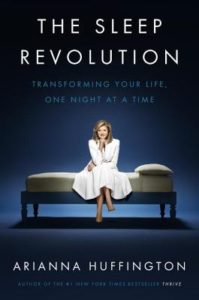
In her book, The Sleep Revolution: Transforming Your Life One Night at a Time, Arianna Huffington takes on these juxtapositions in our society and explains that we are in the midst of a serious sleep deprivation crisis. She shares studies on how lack of sleep negatively impacts all aspects of our health, our work, and our relationships.
She extensively covers the history of sleep, the scientific research into how it benefits our bodies, and even the mysteries of dreams. Huffington clearly outlines how sleep deprived employees actually cost companies more money in errors and what is going right for corporations that encourage rest.
The Sleep Revolution shares the latest findings on how lack of sleep affects diseases like diabetes, obesity, Alzheimer’s, and even cancer. She covers sleep disorders and also devotes a chapter to the dangers of prescription sleep aids and the horrifying tragedies that have occurred even why they’re used properly.
The book is split into two parts. Part one, Wake-Up Call, covers much of the current crisis, the history of sleep, the science behind it, and dreams. Part two, The Way Forward, gets into current issues people face with sleep including the discomforts that come from sharing a bed with another person. The last quarter of The Sleep Revolution offers ideas and strategies for getting better sleep.
The Most Interesting Takeaways:
- Just how sleep deprived American adults truly are. One poll indicated that 40% get significantly less than 7 hours of sleep per night. A National Sleep Foundation report suggested two-thirds of adults aren’t getting enough sleep on weeknights.
- The cost of sleep deprivation to the US economy is more than $63 billion a year. Lack of sleep makes people less productive and more likely to make mistakes. It would be far cheaper for companies to encourage proper rest.
- The Industrial Revolution changed how society valued sleep. It went from something sacred to an obstacle of work, progress, and productivity.
- “The incidence of death from all causes goes up by 15 percent when we sleep five hours or less per night.”
- In several sections, Huffington points out that it’s crazy politicians and policy makers often brag about their lack of sleep. They’re openly admitting that their judgment is impaired. It’s similar to working and making decisions while under the influence.
- “Fact: Twenty-four hours without sleep is the equivalent of a blood alcohol level of 0.1 percent—at which point you are more than legally drunk.”
- Huffington explains the four leading hypotheses for why we need sleep: inactivity theory, energy conservation, restorative theory, and brain plasticity.
- A study found that pregnant women who slept less that 6 hours a night in their ninth month had longer labors and were 4.5 times more likely to need a C-section.
- Huffington shares two strategies that have worked best for her. Getting rid of all technological devices in the bedroom at least 30 minutes before bed. Then if she’s hasn’t fallen asleep within 20 minutes, switching to meditation or reading a book that has nothing to do with her work.
Quotes from The Sleep Revolution:
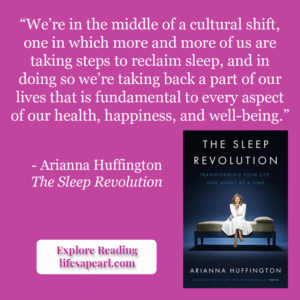
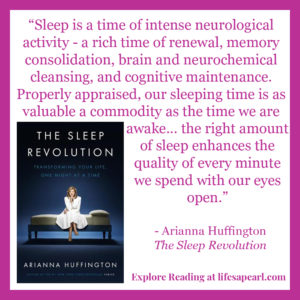
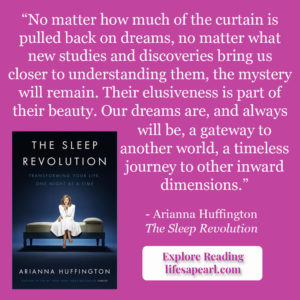
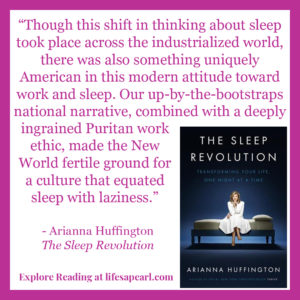
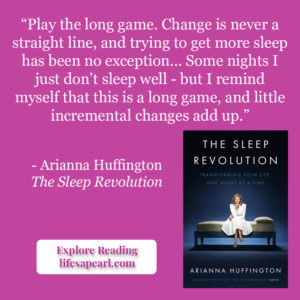
Final Verdict:
Although the first part of this book was really hard for me to get into, I’m glad I read it. Initially after finishing this book, I was pretty lukewarm on it. Since reviewing all of my highlights throughout the book though, I realized there is a lot of good information here.
While I already knew sleep was important, Huffington shares so many facts and findings from scientific studies to back that up. It’s nice to have the concrete evidence to fall back on. That’s really where this book is strongest.
The strategies for better sleep in the last quarter were mostly points I already knew and often implement. There weren’t many new revelations there. Maybe that’s a sign that I understand how to get good sleep but just need to work harder on applying them whenever things get off track.
There’s also a sleep-quality questionnaire at the back of the book. According to my responses, my sleep is already in great shape. That was a pleasant surprise and somewhat subjective indicator that I’m doing something right. It could also be why a lot of the information in this book didn’t feel revolutionary.
Overall, the organization in The Sleep Revolution seemed off. Even when I look at my notes similar points are all over the place rather than in one chapter covering that concept. I think the book probably could have been cut in half with some restructuring. That may have been more successful in getting the information across with a positive reader response.
Book Pick for May
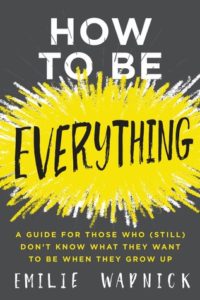
In May, I’m picking up Emilie Wapnick’s book, How to Be Everything: A Guide for Those Who (Still) Don’t Know What They Want to Be When They Grow Up. She has an inspiring Ted Talk, Why some of us don’t have one true calling, where she explains multipotentialites and why to celebrate them. These are people who don’t focus on one career or hobby, but have a range of interests and jobs over a lifetime.
In How to Be Everything, Wapnick shares that having several interests and curiosities isn’t a bad thing. It can actually be your biggest strength! She helps the reader take their many passions and skills and make them work to their advantage. It’s possible to create a sustainable life that includes all your interests.
Learning more about Wapnick’s work appeals to me since I often feel scattered in so many directions by my different passions. I don’t know how to choose what to focus my time and resources on in order to gain an expertise, let alone create a career.
This will come as a surprise to nobody who knows me, but I definitely still don’t know what I want to be when I “grow up”. The older I get though, the more I suspect this is common for a lot of people. Perhaps we should change the societal narrative surrounding that.
Do you make sleep a priority? What’s your bedtime routine? Share your favorite strategies for getting better sleep in the comments below.
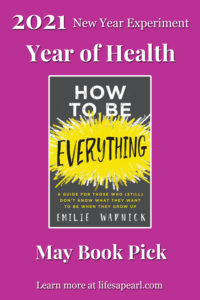
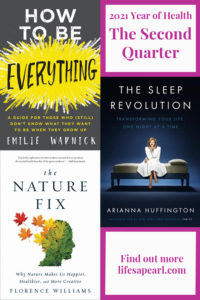
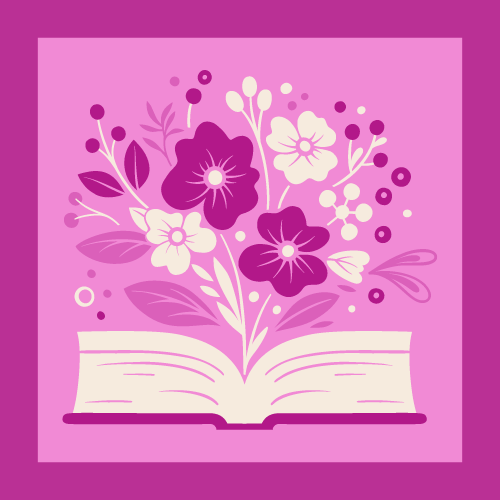
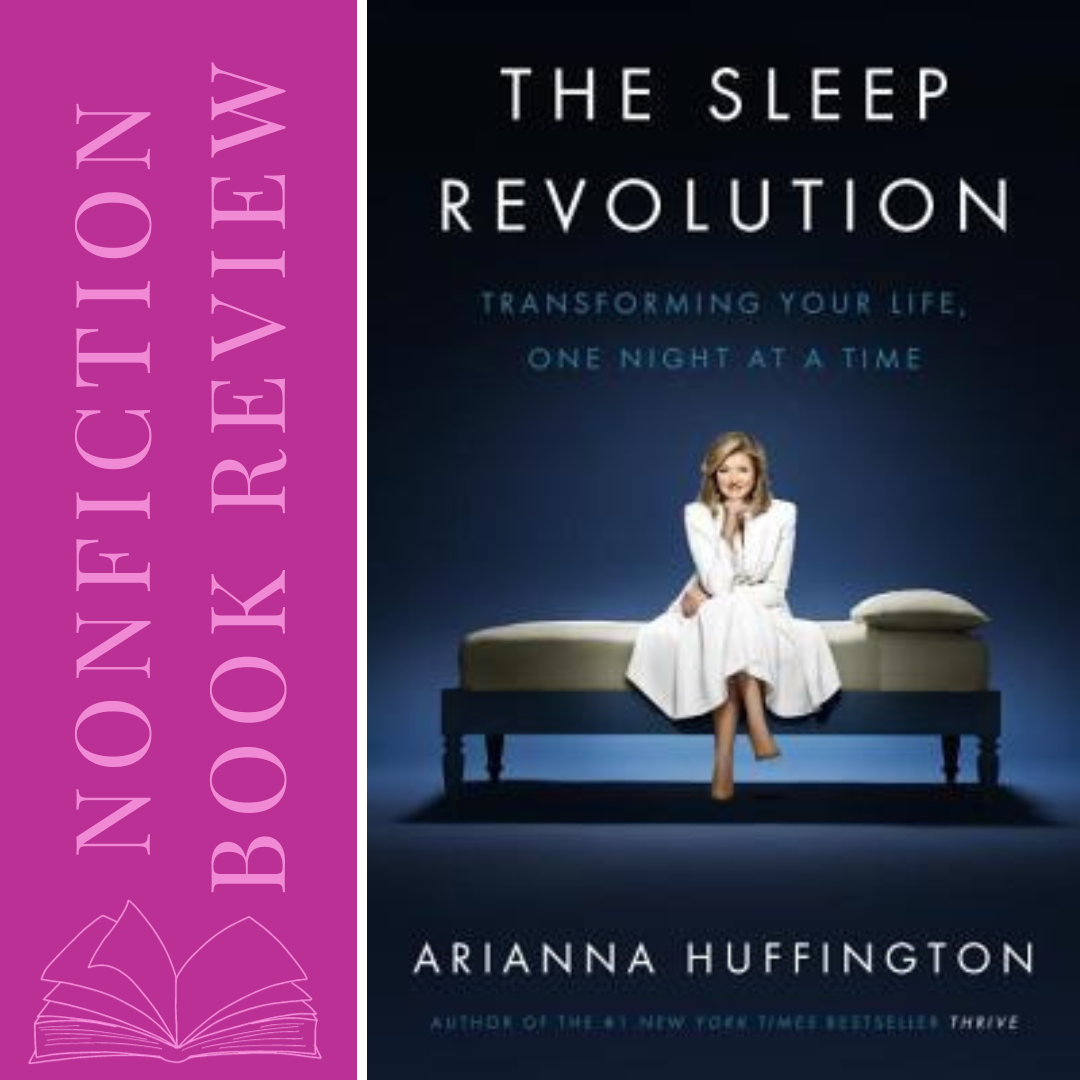
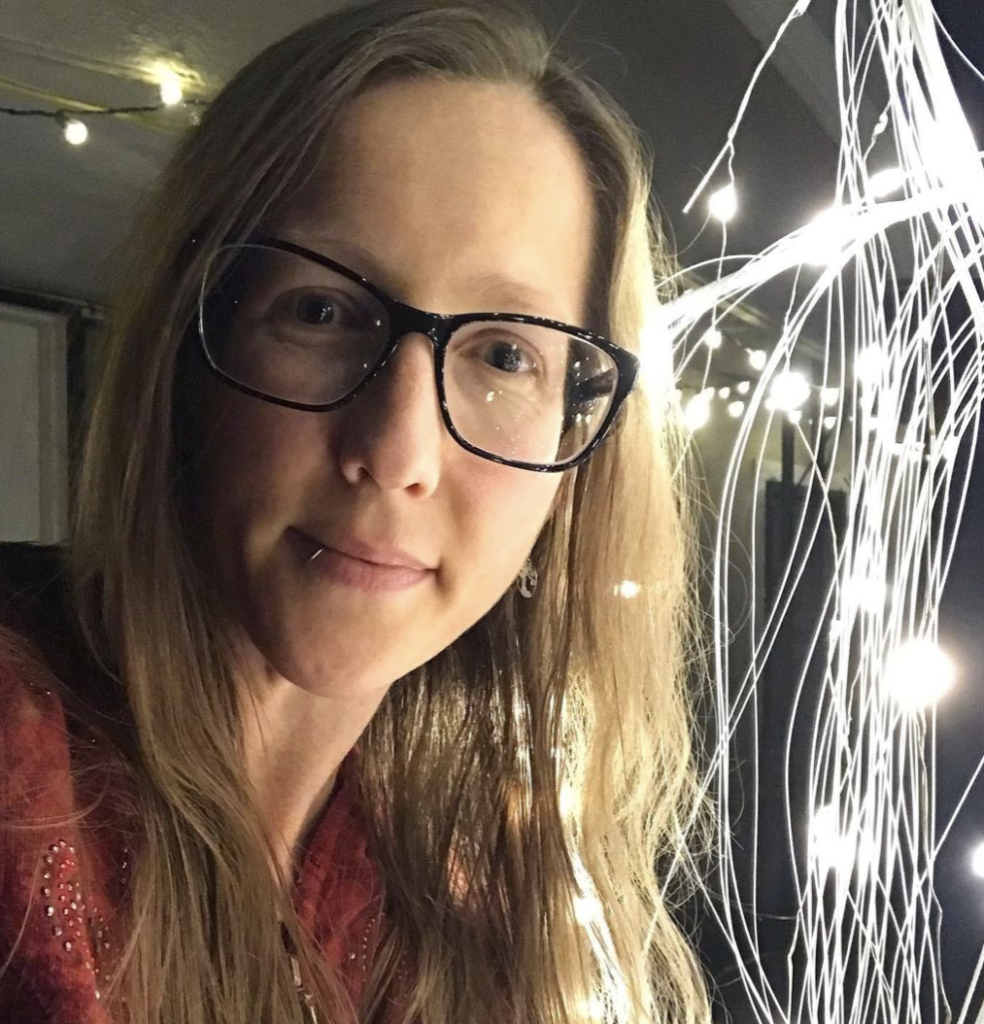
2 responses to “Nonfiction Book Review: The Sleep Revolution by Arianna Huffington”
So interesting!! My problem with sleep is I enjoy having free time and reading before bed! I try to limit how often I read because I don’t have the self control to stop a book once I start it very often. It’s my own self sabotage!
How opposite! I tend to fall asleep faster with a book – if I’m truly tired, I just can’t keep my eyes open for long. I do have to be careful with thrillers/mysteries because I can get caught up in the story and stay up halfway through the night. That just goes to show there’s no one solution for us all, we have to experiment to find our own balance. Thanks for sharing!